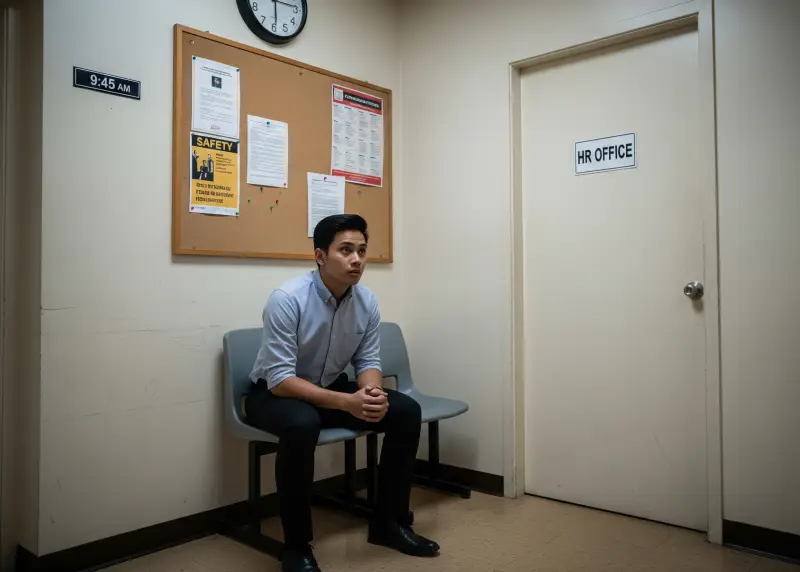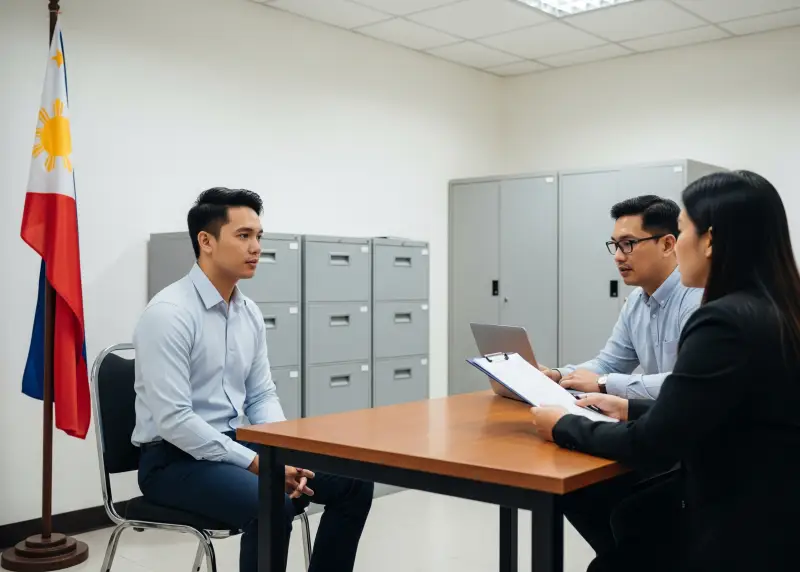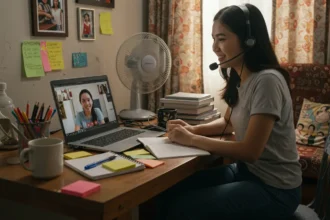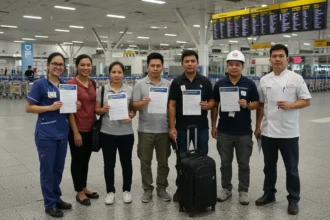Landing your dream job in the Philippines often comes down to how well you perform in a job interview. For many Filipinos, the interview process can feel intimidating, especially when faced with unexpected questions from Pinoy employers. The good news? You can prepare ahead of time by understanding the most common Pinoy employer questions and learning how to answer them with confidence.
- Why Job Interviews Are Critical in the Philippines
- Top 10 Common Pinoy Employer Questions and How to Answer Them
- Table 1: Common Pinoy Employer Questions at a Glance
- 👀 Body Language and Communication Tips for Pinoy Job Interviews
- Table 2: Do’s and Don’ts in Pinoy Job Interviews
- FAQs About Job Interviews in the Philippines
In this article, we’ll dive into proven strategies, sample answers, and practical tips that will help you ace your next job interview.
Why Job Interviews Are Critical in the Philippines
In the Philippines, a job interview is more than just a test of skills or credentials – it’s a window into character and cultural fit. A polished résumé may open the door, but it’s the interview that decides whether you walk through it.
Employers are not only evaluating what you can do but also how you will work with others. In a culture that values harmony, respect, and loyalty, the right attitude often weighs as heavily as technical ability.
What Employers Look For in Interviews
-
Confidence without arrogance – Speaking clearly and presenting yourself well shows readiness, but being too boastful can be a red flag.
-
Respect for company culture – Using “po” and “opo,” dressing appropriately, and showing courtesy to everyone (from the receptionist to the interviewer) matters.
-
Adaptability and teamwork – Employers want people who can adjust quickly and collaborate in a team-driven environment.
-
Strong work ethic – Punctuality, preparedness, and a willingness to go the extra mile signal reliability.
Beyond these, Filipino employers often look for traits deeply tied to local values:
-
Pakikisama – The ability to get along with colleagues and maintain good working relationships.
-
Malasakit – Genuine concern for the company, the work, and the team’s success, not just one’s own career.
In many cases, a candidate who shows humility, respect, and willingness to learn can win over an employer even if they don’t tick all the boxes on paper. That’s because in the Philippine workplace, skills can be taught, but character is harder to shape.

Top 10 Common Pinoy Employer Questions and How to Answer Them
1. Tell me about yourself.
-
Employers want to know if you’re confident and focused.
✅ Tip: Share your career background, skills, and goals without rambling.
✅ Sample Answer: “I’m a marketing graduate with 3 years of experience in digital campaigns. I enjoy creative problem-solving and I’m eager to contribute fresh ideas to your growing team.”
2. Why do you want to work here?
-
Tests your research about the company.
✅ Tip: Highlight company values, culture, or achievements.
✅ Sample Answer: “I admire how your company supports career growth. I believe my skills in customer service align well with your mission to deliver outstanding client experiences.”
3. What are your strengths and weaknesses?
-
Employers value honesty and self-awareness.
✅ Tip: Share a strength that fits the role, and a weakness you’re working on.
✅ Sample Answer: “My strength is adapting quickly to challenges. A weakness I’m improving is time management, and I’ve started using productivity tools to address it.”
4. Can you work under pressure?
-
Many jobs in the Philippines demand flexibility.
✅ Tip: Give a specific example from past experience.
✅ Sample Answer: “Yes. In my previous role, I managed client escalations during peak season and delivered results without missing deadlines.”
5. How do you handle conflict at work?
✅ Tip: Show maturity and professionalism.
✅ Sample Answer: “I believe in addressing conflicts calmly. I listen first, then propose solutions that benefit both parties.”
6. Why should we hire you?
✅ Tip: Position yourself as a problem-solver.
✅ Sample Answer: “I bring a mix of technical expertise and interpersonal skills, which I believe will add value to your team.”
7. Where do you see yourself in 5 years?
✅ Tip: Show ambition but stay realistic.
✅ Sample Answer: “I see myself taking on leadership responsibilities while continuing to learn and contribute to company growth.”
8. What salary are you expecting?
✅ Tip: Research industry standards in the Philippines.
✅ Sample Answer: “Based on my experience and research, a fair range would be between ₱25,000 to ₱30,000 monthly, but I’m open to discussing depending on the benefits package.”
9. Do you have any questions for us?
✅ Tip: Always ask something thoughtful.
✅ Sample Questions:
-
“What does success look like in this role?”
-
“How do you support employee growth and training?”
10. Are you willing to work overtime or on weekends?
✅ Tip: Be honest while showing flexibility.
✅ Sample Answer: “I value work-life balance, but I understand deadlines are important. If needed, I’m willing to work extra hours to support the team.”
Table 1: Common Pinoy Employer Questions at a Glance
| Question | What Employers Look For | Best Approach |
|---|---|---|
| Tell me about yourself | Confidence & clarity | Highlight career background |
| Why do you want to work here? | Research & motivation | Connect skills to company mission |
| Strengths & weaknesses | Self-awareness | Strength relevant to job, weakness with improvement |
| Work under pressure? | Resilience | Share specific examples |
| Conflict handling | Maturity | Problem-solving mindset |

👀 Body Language and Communication Tips for Pinoy Job Interviews
In the Philippines, how you say something often matters just as much as what you say. Employers pay close attention to body language, tone, and subtle cues during interviews. Mastering these small details can set you apart from dozens of other applicants.
Eye Contact
Maintain natural eye contact to show confidence and sincerity, but avoid an intense stare. Too much can feel intimidating, while too little may signal nervousness or dishonesty. The goal is balance – like how you’d speak to a respected teacher or elder.
The Handshake
If the interviewer offers their hand, return with a firm but polite handshake. Limp handshakes may be read as insecurity, while overly strong grips can feel aggressive. For panel interviews, acknowledge each person with a handshake and a smile if possible.
Voice and Language
Speak clearly and at a steady pace. Many interviews are in English, but if the interviewer switches to Tagalog or Taglish, it’s fine to mirror their tone. What matters most is clarity and respect – avoid filler words like “ano,” “uhm,” or “parang” too often, as they can distract from your message.
The Power of a Smile
Filipino employers value warmth. A natural smile shows approachability and confidence without arrogance. It also demonstrates pakikisama – that you’re someone who can fit into a team and work well with others.
Posture and Gestures
Sit upright, keep your hands visible, and avoid fidgeting with pens or cellphones. Nod occasionally to show you’re actively listening. These non-verbal cues communicate respect and engagement, which matter greatly in Filipino workplaces.
Table 2: Do’s and Don’ts in Pinoy Job Interviews
| Do’s | Don’ts |
|---|---|
| Dress professionally (neat & modest) | Wear overly casual clothing |
| Arrive 15 minutes early | Show up late |
| Bring extra copies of your resume | Arrive empty-handed |
| Answer confidently but respectfully | Interrupt the interviewer |
| Research the company | Ask about salary too early |
FAQs About Job Interviews in the Philippines
1. How long do Pinoy job interviews usually last?
Most job interviews in the Philippines last around 20–45 minutes, depending on the role and the number of interview stages. Senior-level positions may take longer.
2. Should I answer in English or Tagalog?
It depends on the company. For corporate or multinational firms, English is preferred. For local companies, a mix of English and Tagalog is acceptable as long as you communicate clearly and professionally.
3. What if I don’t know the answer to a question?
Don’t panic. Instead of guessing, be honest and express willingness to learn. Example: “I haven’t encountered that yet, but I’m eager to learn and I’m confident I can adapt quickly.”
4. Is it okay to negotiate salary in the Philippines?
Yes, but timing is crucial. Wait until the employer brings up the salary discussion, then negotiate politely with research-based figures to justify your request.
5. How soon should I follow up after an interview?
A polite follow-up can be sent within 3–5 business days. Thank the interviewer for their time and politely ask about the status of your application.
6. What should I bring to a job interview?
Be prepared by bringing:
-
Multiple copies of your resume/CV
-
A valid government ID
-
A pen and small notepad
-
Supporting documents (Transcript of Records, certificates, or portfolio if required)
7. How should I dress for a job interview in the Philippines?
Dress in professional or business attire, even if the company is casual. For men, a polo or long-sleeved shirt with slacks works. For women, a smart blouse or dress with minimal accessories is ideal.
8. Can I use my phone during an interview?
No. Keep your phone on silent or turned off during the interview. Using your phone gives a bad impression of being unprofessional and distracted.
9. How do I answer if they ask about my previous employer?
Always remain professional and respectful. Even if you had a bad experience, avoid negativity. Instead, focus on what you learned and how it prepared you for the new role.
10. What’s the best way to end a job interview?
End with a thank you and a strong closing statement. Example: “Thank you for the opportunity to share my background. I’m very interested in the role and I believe my skills can contribute to your team’s success.”
Mastering job interviews in the Philippines isn’t just about memorizing answers – it’s about understanding what local employers value and showing them you belong in their workplace. Confidence, preparation, and respect go a long way, but so do qualities deeply tied to Filipino culture: pakikisama (being easy to work with) and malasakit (genuine care for your work and colleagues).
If you know the common questions, present yourself with warmth and professionalism, and carry the right attitude, you’ll already be one step ahead of many other applicants. Remember, employers are not only hiring skills; they are choosing someone they can trust to represent their company values.
In a competitive market where thousands of Filipinos apply for the same role, the interview becomes your best chance to rise above the crowd. Treat it not as an interrogation, but as your moment to tell your story – why you’re capable, why you belong, and why you’ll thrive.
👉 At the end of the day, it’s not just about getting hired. It’s about finding a workplace where you can grow, contribute, and build a future. Keep learning, keep practicing, and stay updated with resources like JobStreet Philippines or Kalibrr to track hiring trends.
And speaking from experience, every interview – whether it ends in “yes” or “no” – brings you closer to the opportunity meant for you.










